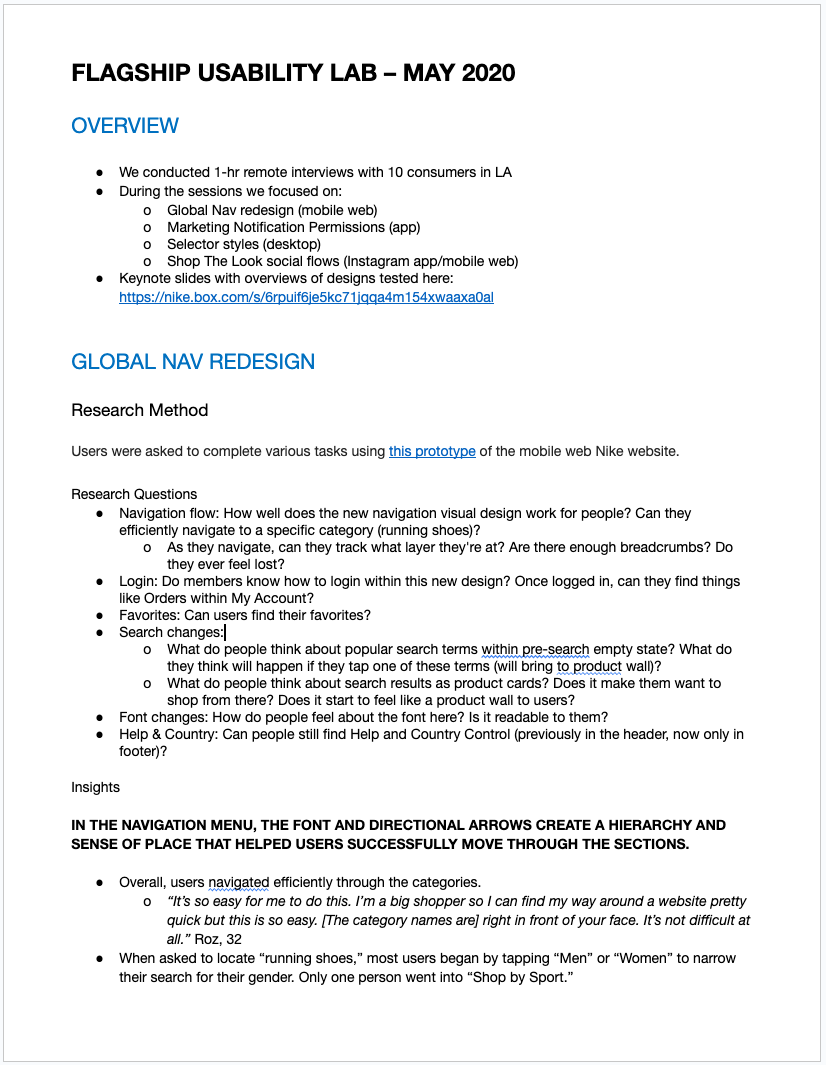
Monthly eCommerce Rolling Research Program Creation and Execution
2020
Customer: Nike
Methods used: 1:1 interviews, usability testing, preference testing, concept testing, and card sorting
Tools used: UserTesting, Optimal Workshop, Figma, Excel, Keynote, Slack
Stakeholders: Nike digital designers and product managers
Timeframe: 8 months
Challenge
Nike’s Global Digital Product and Design teams craved customer feedback on digital shopping experiences that were in development. Unfortunately, their requests were often declined because of limited resources and a large research backlog that prioritized larger, strategic research projects.
Solution
Establish a monthly research program to help answer tactical questions on a shorter time frame, thus helping the Digital Product and Design teams make research-driven decisions for website and app shopping experiences.
Influence
This program increased access to research and allowed for rapid design iteration, making it a highly desired and more meaningful part of the design process. Within a few months, discussions began to strategize ways to expand this research type into other business areas.
My Role
I built the new monthly rolling research program and complete end-to-end research for 3-4 topics each month. For each topic I:
Met with the associated product manager or designer to discuss their specific research objectives and review/provide feedback on stimuli
Developed a test plan
Conducted moderated sessions
Analyzed and reported findings
Provided strategic actionable insights and recommendations that improved the website and app user experience
Approach
Established repeatable and predictable processes: I developed consistent research timelines, procedures, and templates to help us remain on schedule. It also established trust within the Digital Product and Design teams and allowed them to confidently build research into their project timelines.
Ensured alignment on topics: Each month, I made a call for suggested research topics then reviewed and prioritized those topics with Product Managers and Design Leads. This created visibility into the types and number of requests, and gave stakeholders an opportunity to lobby for their topic to be selected.
Shared research best practices: Many stakeholders were unfamiliar with user testing practices. When scoping, test planning, and discussing prototypes, I took the time to explain my approach and why I was requesting certain information or prototype updates.
Created excitement and buy-in: To generate interest and buzz in the new program, I attended several Design and Product team meetings to explain what we were doing and the benefits of their participation. I also encouraged them to observe the sessions to gain a deeper understanding of and empathy for the users’ feedback.
Partnered with an external recruiting firm: I was responsible for managing the relationship with a recruiting firm to ensure we recruited participants with a mix of gender, ethnicity, and age, and were regular athletic shoe shoppers.
Constructed reports for multiple levels: I structured the findings reports and presentations to appeal to stakeholders ranging from individual contributors to senior leadership. This included scannable top line findings as well as specific details to create actionable recommendations.
Method
10, 60-minute moderated 1:1 interviews each month
Methods most frequently used: concept, usability, and preference testing
3-4 topics discussed in each session, including:
Shop the Look landing pages & modals
Global Navigation refresh
Search tool tips
Dual gender size & fit information on PDP
Product wall filtering & toggling
BOPIS in checkout
Paperless returns flow
Editorial content naming and app experience
App notification preferences
Reflection
Building and executing this program gave me confidence in conducting UX research in a fast-paced environment. I quickly learned:
User research principles for usability research and other research methods
A deeper understanding of digital product management, engineering, and design processes, nomenclature, and requirements
Best practices for usability testing with a prototype
The impact of storytelling on stakeholder buy-in
How research recruiting firms and consulting agencies operate
Project Management Template Examples
Monthly task checklist
Research topic nomination form
Meeting invite and Slack communication templates
Report Examples
High-level findings report
Presentation slide example





